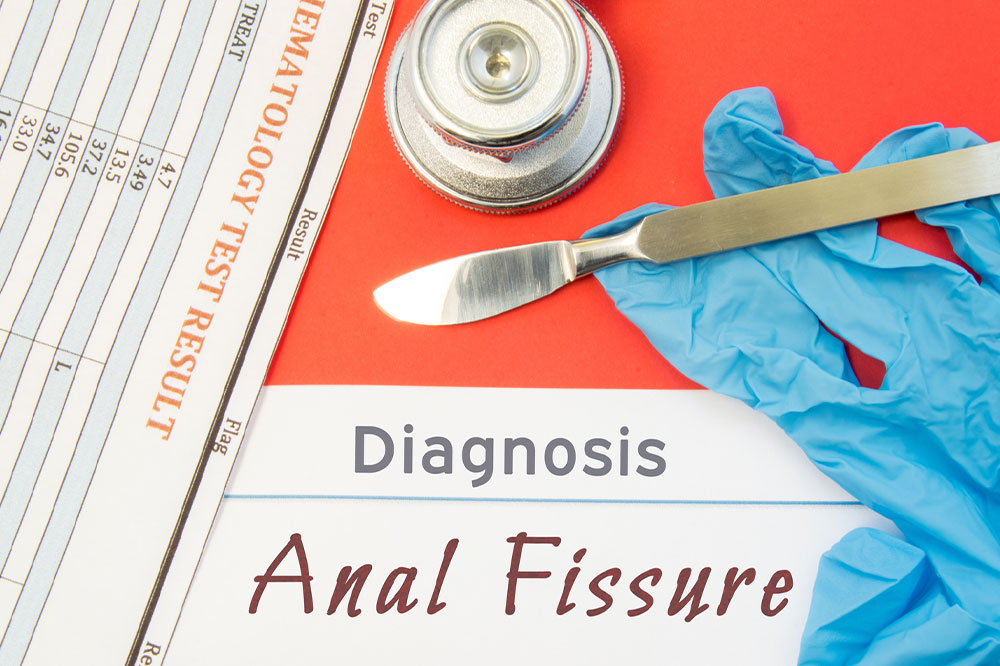Anal Fissures – Its Causes, Symptoms, and Management
Constantly sleeping with makeup on can increase one’s susceptibility to eye infections. Individuals who forget to remove their makeup before sleeping may often find a painful lump growing under their eyelids. Therefore, removing makeup with products that suit one’s eyes is advisable. For example, if an oil-based makeup remover is causing dry eyes, it is best to switch to a mild soap solution to remove makeup.
Signs and symptoms of anal fissures
Here are the signs and symptoms of anal fissures:

Sharp, persistent pain while passing stools
A common symptom of anal fissure is sharp pain while passing stools, typically persistent, lasting for hours after bowel movements.
Anal bleeding
Individuals with anal fissures may experience rectal bleeding during bowel movements, typically caused by increased effort exerted by them to pass stools.
Anal muscle spasms
The sphincter muscle beneath the torn part of the anal canal undergoes spasms, often pulling the edges of the fissure apart and causing severe pain and discomfort. The spasm may also pose a challenge for the fissure to heal. Moreover, it can worsen the tearing of the anal tissue and exacerbate the symptoms. Anal muscle spasms perpetuate anal fissures for approximately 40% of patients.
Skin tag
An anal skin tag refers to skin growth around the anus, particularly in patients struggling with anal fissures and hemorrhoids. Straining to pass stools when constipated is among the leading causes of a skin tag. Since several individuals with anal fissures often experience constipation, skin tags are common symptoms of anal fissures.
Burning or itching
Anal fissures are often characterized by a deep, shooting pain in the affected area, accompanied by severe itching in the perianal region. The itching may worsen at night or after passing stools.
Abdominal pain
Abdominal pain is associated with severe rectal bleeding, which can be a symptom of acute anal fissures.
Dysuria
In some cases, the extreme pain and discomfort associated with anal fissures can also lead to discomfort during urination, a condition called dysuria. It can also be accompanied by an inability to urinate or frequent urination.
Pus formation
Sometimes, infection in the fissure area may lead to pus formation or anal fistula. This condition is caused by acute anal fissures and the consequent development of skin tags.
Causes and triggers
Here are a few causes and triggers of anal fissures:
Chronic constipation
Chronic constipation causes one to put considerable pressure on the muscles while passing stools, which can cause the anal canal region to tear. Constipation is also characterized by hard stools, which can trigger or aggravate the condition.
Chronic diarrhea
Chronic diarrhea may cause the skin in the anal canal to dry up, forming cracks or tears and leading to a fissure.
Inflammatory bowel disease
Patients with inflammatory bowel disease (IBD) conditions, particularly Crohn’s disease, are susceptible to anal fissures. Crohn’s disease involves inflammation of the digestive tract, which can lead to symptoms like severe diarrhea and culminate in anal fistulas, fissures, and skin tags.
Pregnancy
Research findings suggest that up to 40% of pregnant women will likely struggle with constipation during any of the three trimesters. As a result, they are also more vulnerable than others to developing anal fissures. For example, about 40% of pregnant women and women in the postpartum period get anal fissures.
Anal intercourse
Anal intercourse can cause the skin to overstretch, leading to anal fissures.
Sexually transmitted diseases
Sometimes, sexually transmitted infections like herpes, gonorrhea, HIV, and syphilis can also trigger anal fissures.
Tips for managing anal fissures
Here are a few tips for managing anal fissures:
Have specific fiber-rich foods
Fiber-rich foods are generally effective for digestion issues like diarrhea and constipation, which often cause or aggravate anal fissures. However, the type of fiber to be consumed depends on the condition’s exact cause. In other words, soluble fiber, which forms a gel-like substance in the stomach, slows the digestive process and is recommended for diarrhea. In contrast, insoluble fiber speeds digestion and is helpful for patients with constipation. Thus, one’s fiber intake should be based on whether the anal fissure is caused by diarrhea or constipation. Some soluble-fiber foods include whole grains, flax seeds, avocados, Brussels sprouts, and black beans, while insoluble fiber sources are wheat bran, potatoes, green beans, cauliflower, and nuts.
Stay hydrated
As mentioned earlier, constipation is among the leading causes of anal fissures. Dehydration can cause the large intestine to absorb fluid from solid intake, resulting in hard stools and triggering or worsening anal fissures. Hence, it is essential to have plenty of water throughout the day to avoid constipation and prevent or manage anal fissures.
Stay physically active
Physical activity is recommended for patients with anal fissures to relax the anal muscles and facilitate more comfortable bowel movements. It is also effective for individuals with constipation-induced anal fissures. Exercises like aerobics, walking, jogging, cycling, swimming, and dancing can help patients with anal fissures manage their symptoms better.
Try Kegel exercises
Kegel exercises are highly effective in relaxing pelvic muscles and reducing strain on the anal canal. These pelvic floor exercises include tightening and holding the pelvic muscles for a few seconds before releasing. However, it is important to consult one’s doctor before trying these exercises.